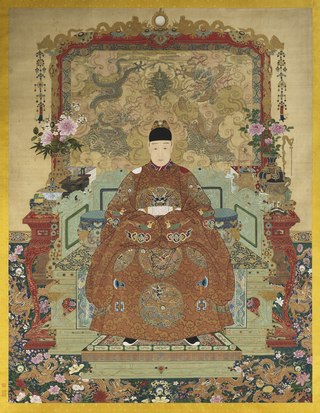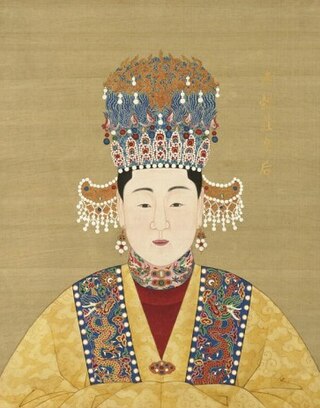
The Taichang Emperor, personal name Zhu Changluo, was the 15th emperor of the Ming dynasty. He was the eldest son of the Wanli Emperor and succeeded his father as emperor in 1620. However, his reign came to an abrupt end less than one month after his coronation when he was found dead one morning in the palace following a bout of diarrhea. He was succeeded by his son, Zhu Youjiao, who was enthroned as the Tianqi Emperor. His era name, "Taichang", means "grand prosperity." His reign was the shortest in Ming history.

The Tianqi Emperor, personal name Zhu Youjiao, was the 16th emperor of the Ming dynasty, reigning from 1620 to 1627. He was the eldest son of the Taichang Emperor and a elder brother of the Chongzhen Emperor, who succeeded him. "Tianqi", the era name of his reign, means "heavenly opening".
The Chongzhen Emperor, personal name Zhu Youjian, courtesy name Deyue (德約), was the 17th and last emperor of the Ming dynasty. He reigned from 1627 to 1644. "Chongzhen", the era name of his reign, means "honorable and auspicious."
Zhu Biao was the Hongwu Emperor's eldest son and crown prince of the Ming dynasty. His early death created a crisis in the dynasty's first succession that was resolved by the successful usurpation of his brother Zhu Di as the Yongle Emperor, an act with far-reaching consequences for the future of China.
Zhu Yihai, courtesy name Juchuan (巨川), art name Hengshan (恆山) and Changshizi (常石子), was a regent of the Southern Ming dynasty from 1645 to 1653.
Empress Xiaominrang, of the Ma clan, was the empress consort to the Jianwen Emperor and the second empress consort of China's Ming dynasty.

Zhu Youyuan, was a prince of the Ming dynasty of China. He was the fourth son of the Chenghua Emperor.
Taizi was the title of the crown prince of imperial China.

The princes of the Ming dynasty were titled and salaried members of the imperial bureaucracy with nominal lordship over various fiefs of Ming China. All were members of the imperial Zhu clan descended from the twenty-six sons of Zhu Yuanzhang. None of the princes controlled the administration of their nominal fief, unlike some tribal leaders or Confucius' descendants, the Dukes of Overflowing Sagacity, who continued to rule their territories outside of the normal provincial system.
Prince of Jingjiang (靖江王) was a princely peerage created and used during the Ming dynasty. It was the tenth princely peerage created by the Hongwu Emperor; his grandnephew Zhu Shouqian was the first to be enfeoffed as Prince of Jingjiang. The Princedom of Jingjiang was distinct from other princely peerages in that the princely title contained two Chinese characters, common to second-rank princedoms but not first-rank princedoms. Nevertheless, the Prince of Jingjiang was still a first-rank princely peerage. The heir apparent to the Princedom of Jingjiang was styled Hereditary Prince, but the titles for other non-inheriting male members of the line was bulwark general or supporter general while female members were styled county lady or village lady, not commandery prince/princess as was common with other first-rank peerages.
Noble Consort Zheng (1565–1630), was a Ming dynasty concubine of the Wanli Emperor. She is known for having been his most beloved consort and, in an attempt to please her, he tried to make her son his heir apparent. This act caused over a decade of conflict and factionalism in the imperial court.
Prince of Qi was a first-rank princely peerage of the Ming dynasty created by the Hongwu Emperor. The first Prince of Qi was Zhu Fu, 7th son of the Hongwu Emperor. He was made the principality by his father in 1370. The peerage later abolished by the Jianwen Emperor in 1399, and abolished again by the Yongle Emperor in 1406 after the re-creation of 1403. After Zhu Yujian enthroned as the Longwu Emperor of the Southern Ming, he posthumously restored Zhu Fu's princely title and princedom. The Chongzhen Emperor also posthumously bestowed 3rd son of his father, the Taichang Emperor, Zhu Youji (朱由楫) under the title of Prince of Qi.
Zhu Changxun (1586–1641) was the third son of the Ming dynasty Wanli Emperor. His mother, Noble Consort Zheng, was a favoured concubine and, in efforts to please her, the emperor attempted to have Zhu made heir apparent, but failed to overturn the rule of primogeniture. After the fall of the Ming, however, Zhu's son, Zhu Yousong, became emperor of the Southern Ming dynasty.
Prince of Xing, was a first-rank princely peerage used during Ming dynasty, the principality was created by Chenghua Emperor for his fourth son, Zhu Youyuan. As Zhu Youyuan only survived son, Zhu Houcong was enthroned as Jiajing Emperor, the principality was absorbed into the crown.
Prince of Fu, was a first-rank princely peerage used during Ming dynasty, this peerage title was created by Wanli Emperor. The first Prince of Fu was Zhu Changxun, 3rd son of Wanli Emperor. This peerage had 2 cadet commandery princely peerages, all of these second-rank peerages had not inherited. The first Southern Ming emperor, Zhu Yousong was the last title holder of this peerage.
Prince of Zhao, was a first-rank princely peerage used during Ming dynasty, this peerage title initially was created by Hongwu Emperor for his ninth son he was deceased. The princedom later created again by Yongle Emperor and was held by Zhu Gaosui, 3rd son of Yongle Emperor.

Empress Xiaoyizhuang, of the Li clan, was a Chinese imperial consort of the Ming dynasty, she was the first wife of the Longqing Emperor. Her father is Li Ming (李铭).
Zhu Shizhen, born Zhu Wusi, was the father of Zhu Yuanzhang, the founding emperor of the Ming dynasty. He was a native of Jurong. The ancestors of the Zhu family had lived in Pei and later moved to Jurong. His father, Zhu Chuyi, moved to Xuyi, Si Prefecture, and Zhu Shizhen moved again to Zhongli, Haozhou.
Zhu Shangbing, the Prince of Qin (秦王), was a Chinese prince of the Ming dynasty. He was the eldest son of Zhu Shuang, Prince Min of Qin, the ninth grandson of the Hongwu Emperor, and the maternal grandson of Deng Yu.





